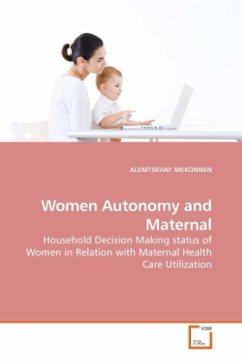Though gender inequality is often cited as a barrier to improving maternal health in developing countries, little attention has been given in understanding how a woman's position within her household may affect the receipt of health care. Women's ability to participate in household decisions and utilization of maternal health services are influenced by husband or families in their households. More over there is little change in reproductive health-care-seeking behavior, as observed in various demographic and health surveys. Although it seems reasonable to assume that greater equality within the household leads to higher use of maternal health care services, this factor has not been well explored in Ethiopia. This book, therefore, provides you women's position in their household, its relation with maternal health care utilization and the determinant factors for it. Findings from this study will have implications on designing and implementing health policies and programs in Ethiopia
Bitte wählen Sie Ihr Anliegen aus.
Rechnungen
Retourenschein anfordern
Bestellstatus
Storno








